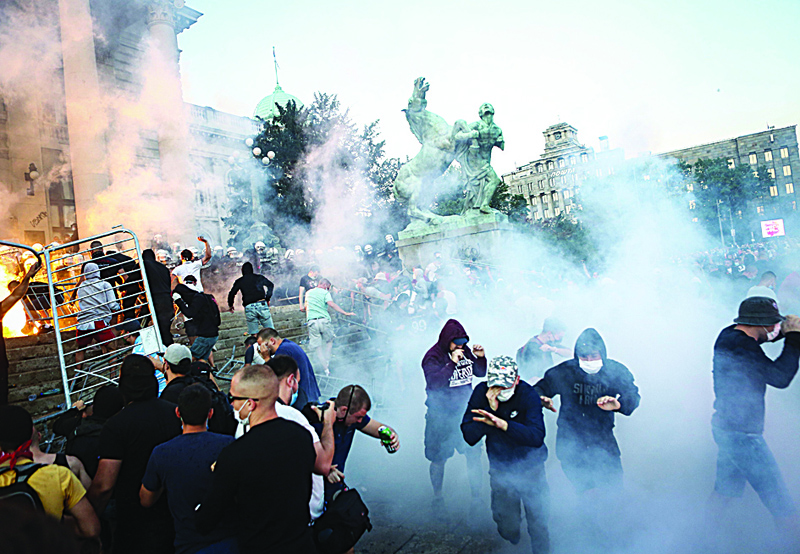
BELGRADE: Serbian police fired tear gas at anti-government protesters after being pelted with flares and stones on Wednesday as thousands protested in front of the Belgrade Parliament despite warnings that such gatherings could spread coronavirus infections. The evening before, violence erupted when a crowd stormed Parliament in protest of plans to reimpose a lockdown following a new spike in COVID-19 cases. Forty-three police officers and 17 protesters were injured and there were 23 arrests. Although President Aleksandar Vucic hinted Wednesday he may back down from his plan to introduce a weekend lockdown, demonstrators began gathering in front of the Serbian Parliament building around 6 pm.
In his address to the nation Wednesday, Vucic called on people to stop attending anti-government rallies to avoid a further spread of the coronavirus. "There are no free beds in our hospitals. We will open new hospitals," Vucic said. He accused far-right groups and unspecified regional "intelligence officials" of orchestrating riots to "undermine Serbia's position". Most of the protesters on Wednesday evening wore face masks, blew whistles and shouted "Vucic leave!" as they faced off with riot police guarding the Parliament complex. Some threw stones and flares at police who responded with volleys of tear gas.
Interior Minister Nebojsa Stefanovic said 10 policemen have been injured. He did not say how many demonstrators have been hurt. TV footage showed policemen beating up protesters. Violence also erupted in the northern town of Novi Sad, Nis in the south and Kragujevac in central Serbia when police clashed with anti-government protesters. Vucic on Wednesday said he had ultimately advised the government and health authorities not to introduce a new lockdown in Belgrade. The government will announce a new set of restrictive measures on Thursday, he said.
Serbia, a country of 7 million, has reported 17,076 COVID-19 cases and 341 deaths. Health authorities say hospitals are running at full capacity and staff are exhausted. The number of new infections rose to 357 on Wednesday from 299 on Tuesday. Critics say the government's decisions to allow soccer matches, religious festivities, parties and private gatherings to resume and parliamentary elections to go ahead on June 21 are to blame for the new surge in infections. The government blames a lack of sanitary discipline among the public, especially in nightclubs. - Reuters

